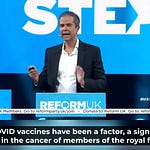[Dear Readers: As usual, the full subtitled clip is below, with short highlights above.]
In an episode aired on 11th March 2024, on the program Kolloquium on wikisana.ch [SOURCE], Dr. Dietrich Klinghardt, a seasoned physician with 48 years of experience, shared his observations on the alarming rise in cancer cases. His insights offer a critical reflection on the current trends in health and disease management.
Dr. Dietrich Klinghardt, started his journey in medicine and psychology in Freiburg, Germany, where he also earned his PhD with a study on how our body's internal nervous system interacts with autoimmune diseases.
Dr. Klinghardt described the increase in cancer cases as the "hockey stick phenomenon," a term that paints a vivid picture of the situation. Just like the shape of a hockey stick, cancer cases have been slowly rising over decades, only to see a dramatic and sudden spike in the last one and a half years. This sharp increase in cases is unprecedented and very similar to the trend of cancer drug sales that I am seeing from my industry sources.
In a particularly striking segment of his discourse, Dr. Klinghardt shared insights drawn from decades of close patient observation, underscoring the alarming evolution of cancer cases he's witnessed. "I have many patients that I still know from my early time, and many patients I have been caring for in my current patient population for 20 years, where at the beginning we treated cancer or co-treated it and the patients were considered cured," he elucidated. This long-term relationship with his patients provided him with a unique vantage point to notice disturbing trends.
He went on to describe a worrying phenomenon: "And where suddenly not necessarily the same cancer disease, but a different type of cancer suddenly exploded." The contrast he draws between past and present is stark and unsettling. "And the types of cancer that are emerging now are much more aggressive and faster than anything we've observed in these 48 years. This was unprecedented; it's something entirely new." Dr. Klinghardt's use of the term "unprecedented" not only highlights the severity of this issue but also marks it as a drastic departure from the patterns he's observed over his nearly five-decade-long career. His first-hand account serves as a crucial testament to the changing landscape of oncology, one that raises significant concerns and calls for a deeper understanding of its underlying causes.
While the precise causes of this sudden surge remain a topic of caution due to the sensitive nature of the discussion, Dr. Klinghardt hinted at possible correlations with "special medical measures" introduced in the last one and a half years. However, he refrained from delving deeper into this subject on the show, alluding to the censorship in medical communities: "And whether this is related to the special medical measures that were forced in the last one and a half years, or other phenomena are behind this, I think we need to refrain from discussing in the context of this show."
Dr. Klinghardt also highlighted a notable observation from his own practice. Many of his patients, known to have a genetic predisposition to cancer, have experienced an "explosion" of cancer cases. This isn't limited to the recurrence of previously treated cancers but includes the emergence of new, more aggressive, and faster-progressing types of cancer. This, Dr. Klinghardt described, is entirely new in his decades-long career, marking a concerning shift in the nature of cancer diseases presenting in patients today.
Interestingly, Dr. Klinghardt pointed out that this significant increase in aggressive cancer cases primarily affects those who followed state-recommended medical interventions.
He also suggested an alternative reason for the observed increase in cancer rates, pointing to activation of 5G networks in recent years saying "…I want to say, as an alternative reason for the increase we observe at least, the activation of the 5G networks is certainly involved." This statement adds a layer of complexity to the conversation around public health and technology, indicating the need for further research and dialogue on the potential impacts of 5G networks on human health.
I remember, about a decade ago at the height of my career in Pharma, making a conscious decision to stop holding mobile phones to my ear during calls. It was around that time I began to notice something unsettling – not only were many drug studies questionable in their integrity, but it seemed like new technologies were skipping the scrutiny of studies altogether. This realization hit me hard, especially as I was deeply involved in the marketing of cancer drugs and met numerous cancer patients. Witnessing their struggle firsthand, I couldn't help but feel a growing concern over our reliance on these technologies.
Anyway, Dr. Klinghardt brought up another point on the so-called "excess mortality" rate. Contrary to the first year of the disease outbreak, where mortality rates were statistically lower or unchanged, the last one and a half years, after vaccination campaigns began, have seen an undeniable spike in mortality. This is definitely another signal that these mRNA gene therapies must be pulled out as soon as possible.
Anyhoo, signing off for now,
A17
FULL CLIP HERE:











